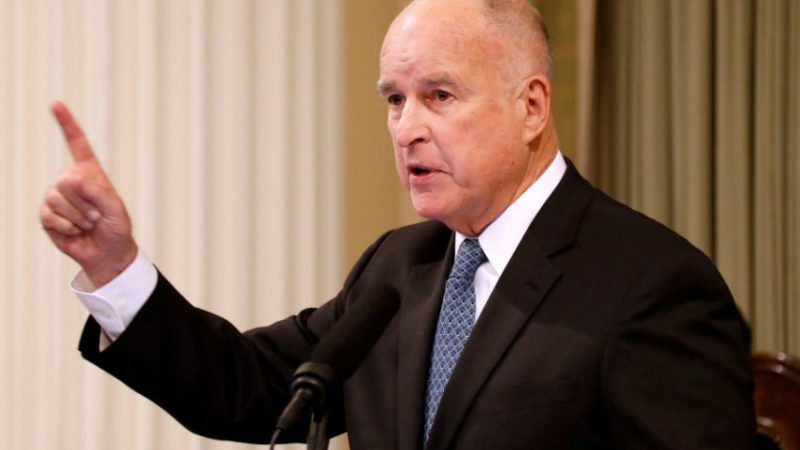The Last Adult in Sacramento
Making sense of the complicated and contradictory legacy of California Gov. Jerry Brown.

Three years after his failed run for the Democratic presidential nomination in 1992, California's once and future governor addressed the International Transpersonal Association Conference. I have no idea what that is, but the group's name—and his ruminations on the nation's political system—were just so Jerry Brown.
After a joke about the small crowds in New Hampshire, Brown said that "We are in a degenerate state of self-government." He said he didn't want to depress the audience. But "as much as I dislike politics," he noted, "I have devoted my life to it—out of some form of enlightened masochism—or some other deep motive that I have not yet been able to plumb. But I am not sick of it, and I am not cynical about it—but I'm not naive about it."
As Brown heads into the sunset (or at least to his Colusa County ranch), many political writers in California are trying to assess his recent legacy. It's not hard to tally up some of his wins and losses, think about his good policies and bad ones and analyze the latter Brown years as one would analyze the legacy of any politician. But it's much harder to assess Brown using the title of that speech: "Political Consciousness and Transformative Action." Did Brown manage to transform the way politics is done in California?
It's an interesting question because Brown is likely to be remembered as the last adult in Sacramento—the guy who made sure the books were in balance. Some of his parting words echo that theme. In a December 11 exit interview with National Public Radio, Brown touted a $14 billion budget surplus. "Now, what did I do or didn't do?" he asked. "I did rein in spending. I did—and then that took fortitude against the tendency of the Democratic Party to spend on almost anything that somebody comes up with that, you know, that satisfies all of the key constituencies."
That's the kind of accomplishment that any Republican might tout, albeit Brown achieved it with multiple, unnecessary tax increases—and he signed budgets that set records for spending. But there's little doubt that Brown owned the Legislature these past eight years. He got his way on everything from budget negotiations to some of his more controversial priorities (such as a $100 billion bullet train and his climate-change activism).
A little fiscal responsibility isn't really transformative. Balancing the books and building up a rainy day fund is arguably the fundamental job of the governor. Doing so as the member of a party that typically had supermajorities in the Legislature and controlled every statewide constitutional office shouldn't be that big of a deal. But his efforts often worked against his own party which, as he added, "only know[s] how to say 'yes,' even to harebrained schemes."
Two of his most significant accomplishments often are overlooked. In 2011, the federal courts had ordered California to reduce its prison overcrowding from 180 percent to 137.5 percent of design capacity within two years. Republicans still complain about the resulting policies, namely the "realignment" law that sent many nonviolent state prisoners to county jails and voter initiatives that reduced sentences for some offenders. But Brown was at his best there.
He at one point vowed to defy the federal orders for further reductions, but he wasn't about to let 10,000 felons loose on the streets two years after he had already passed that realignment plan. Ultimately, Brown won an extension from the courts and the prison population fell after voters approved a couple of criminal-justice initiatives.
The other significant, but overlooked, policy involved his 2011 dissolution of the state's notoriously ham-fisted redevelopment agencies, which subsidized private development and routinely abused eminent domain. Brown dissolved the agencies because he desperately needed cash during a budget crisis. But it was a big deal whatever his motivations.
Ironically, as his administration reaches its end, Brown has taken on some of the more potentially transformative issues. His attorneys have taken an admirable stance before the state Supreme Court arguing for changes in the "California Rule," which makes it virtually impossible for localities to rein in pension debt. Cities are being crushed by overly generous pension promises, and unless that rule is changed they could face a future of diminished services, higher taxes, and even bankruptcy.
Brown also has been setting records for issuing pardons and commutations. He complained about the "atmosphere, the gangs, the hopelessness, sentences that are so long…the no-exit attitude has made it virtually impossible to have any strong rehabilitative atmosphere." His last-minute commutations are a haphazard way to deal with an issue that should have been a feature early in his administration.
But did he transform politics? Of course not. Then again, politics is the wrong place to seek transformation.
This column was first published in the Orange County Register.
Steven Greenhut is Western region director for the R Street Institute. He was a Register editorial writer from 1998-2009. Write to him at sgreenhut@rstreet.org.


Show Comments (28)